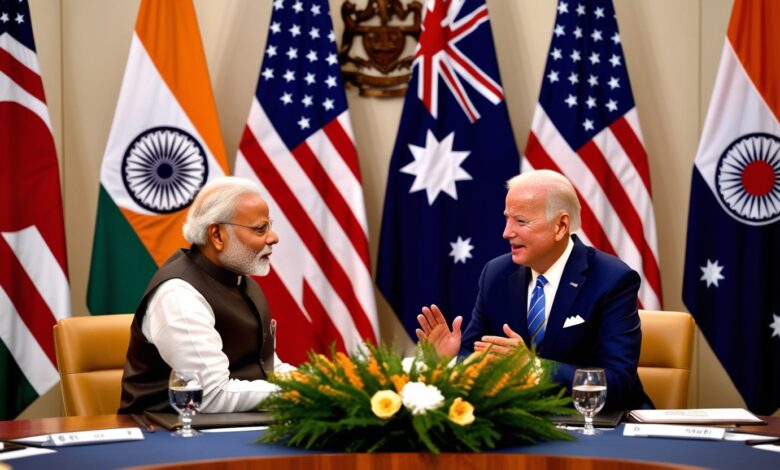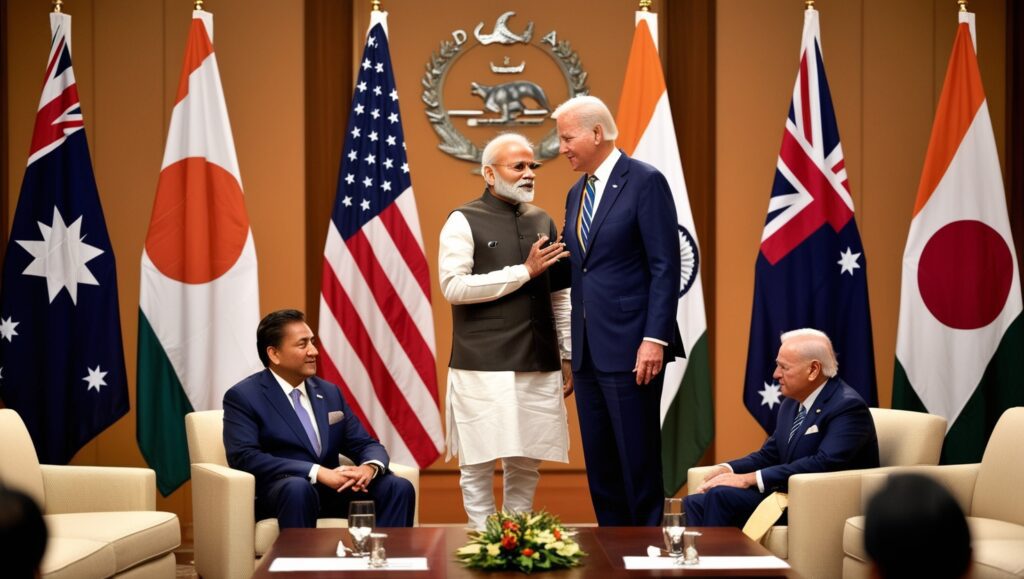India’s Emerging Leadership in QUAD: US Official Statement Sparks Global Discussions

In a recent statement from the United States, India has been recognized as a key leader within the QUAD alliance, an acknowledgment that highlights India’s growing influence on the global stage. This announcement comes just before Prime Minister Narendra Modi’s significant visit to the US, where he is set to meet President Joe Biden and potentially other world leaders. This article delves into the implications of this statement, the current dynamics within the QUAD, and what it signals for India’s foreign policy, especially in relation to the US and other global powers.
India’s Role in QUAD: Leader or Co-Leader?
The QUAD, or Quadrilateral Security Dialogue, is an informal alliance between four key nations—India, the United States, Japan, and Australia—focused on promoting security and cooperation in the Indo-Pacific region. Recently, a US official stated that India is seen as a leader within this group. However, it’s crucial to note that the statement indicated India as “a leader” and not “the leader,” meaning the US still views itself as an equal player in this alliance.

This subtle distinction highlights that while India plays a pivotal role in shaping the QUAD’s policies and direction, it shares leadership with the US. This recognition is a significant diplomatic victory for India, especially as it faces regional challenges from China and growing international expectations.
US Nervous About SCO and BRICS
India’s rising stature in the QUAD is also tied to the US’s concerns about other global alliances, particularly the Shanghai Cooperation Organization (SCO) and BRICS. The SCO, led by China and Russia, is rapidly expanding its influence, which has made the US uneasy about its global standing. Additionally, India’s involvement in the BRICS summit, where discussions about a potential new currency (the R5 currency) are underway, adds another layer of complexity to India’s international relations.
Israel’s Airstrikes on Hezbollah Commanders: Shaping the Middle East Conflict
Prime Minister Modi’s upcoming participation in the BRICS summit in Russia underscores the delicate balancing act India must perform. While aligning with global powers like the US in QUAD, India must also navigate its relationships with countries like Russia and China within other alliances. This dual approach showcases India’s growing diplomatic prowess and its ability to maintain strategic autonomy.
India’s Strategic Diplomacy Amid Growing Challenges
Prime Minister Modi’s visit to the US comes at a time of heightened tension between India and certain separatist elements in the US and Canada. A recent court summons issued to India’s National Security Advisor (NSA) Ajit Doval and former RAW Chief Samant Goel, in connection to an alleged plot involving Khalistani separatist Pannu, has added a layer of controversy to the visit.
India’s response was swift and direct, rejecting any suggestion that its officials would respond to such summons. This incident, coupled with the discovery of the body of an Indian Embassy member in the US, has fueled concerns about the security of Indian diplomats abroad. The Khalistani threat, particularly in North America, continues to loom large, making Modi’s US visit all the more crucial in addressing these concerns diplomatically.
Upcoming QUAD Summit: Key Expectations
As Modi prepares to meet President Biden, one of the most significant items on the agenda is the upcoming QUAD summit. Historically, QUAD joint statements have avoided direct mention of China or Russia, despite underlying tensions. However, Biden is expected to push for a more assertive stance against China in the upcoming summit, possibly urging India to agree to openly name China in joint declarations.
India, known for its cautious foreign policy, has historically refrained from naming China in such contexts. In the 2022 QUAD summit, neither Russia nor China were directly mentioned in the joint statement, and this year is unlikely to be different. Despite increasing tensions with China, India has been carefully managing its relationship with its northern neighbor, as recent diplomatic engagements between the two countries suggest a slow but steady de-escalation of border tensions.
Moreover, India is unlikely to agree to any statements that directly criticize Russia, especially given the close ties between the two nations. With Modi’s upcoming visit to Russia for the BRICS summit, India will want to maintain its neutrality and strategic autonomy, ensuring it does not take sides in global rivalries.
The Future of QUAD: US-India Relations Under Scrutiny
While the US views India as a crucial partner in the Indo-Pacific region, there are signs that the current American administration under President Biden may not take the QUAD as seriously as previous administrations. For example, the scheduling of the QUAD summit has been repeatedly postponed, with President Biden opting to focus on domestic issues rather than international alliances. In December 2023, India was planning to host a QUAD summit during its Republic Day celebrations, but the US chose to cancel, signaling a lack of urgency on America’s part.
If Vice President Kamala Harris were to win the 2024 US presidential elections, it is likely that the current US policies regarding QUAD would continue, with little change in the strategic focus. This could lead to a weakening of the alliance unless India and the other QUAD members push for more consistent engagement.
Conclusion: India’s Balancing Act in Global Diplomacy
India’s growing role within the QUAD is a testament to its increasing importance on the world stage. As the US acknowledges India’s leadership, it also highlights the delicate balance India must maintain in its relationships with global powers like Russia, China, and the US. As Modi’s US visit unfolds and the QUAD summit approaches, all eyes will be on how India navigates these complex diplomatic waters.






2 Comments